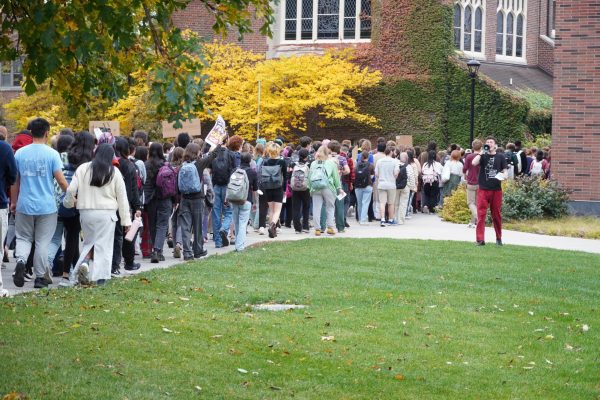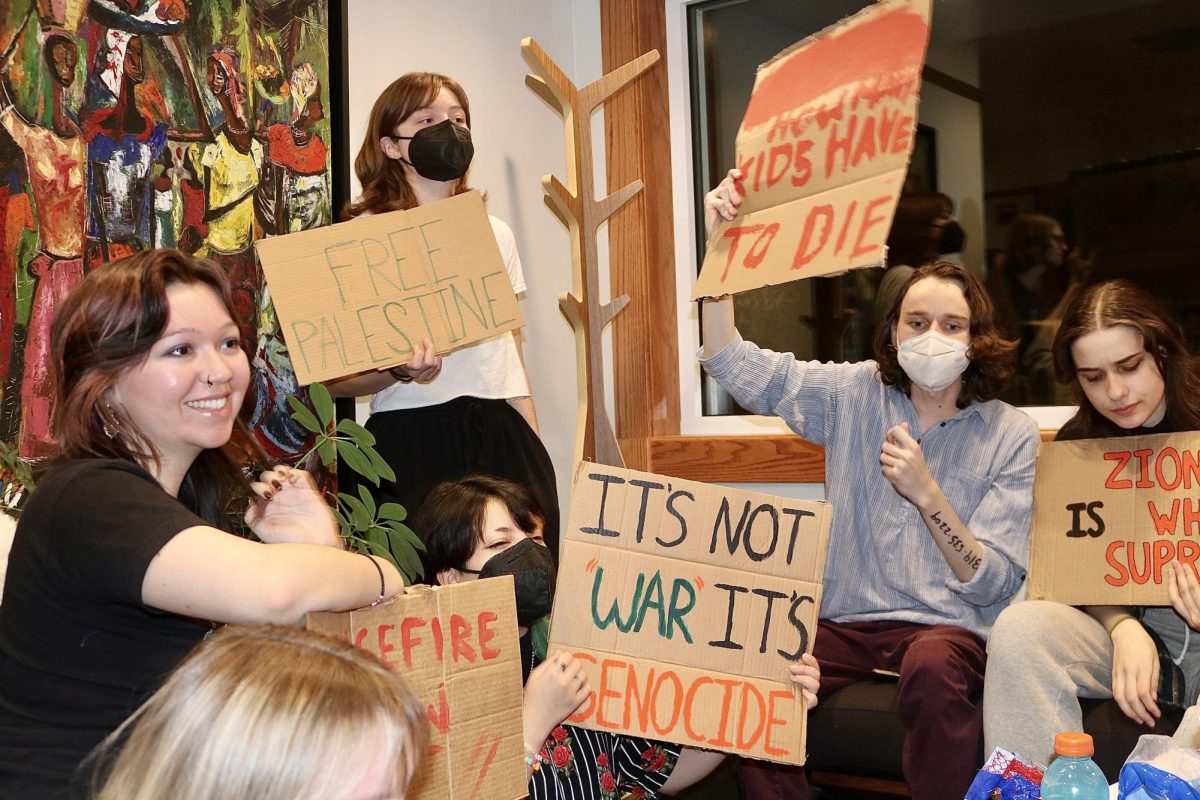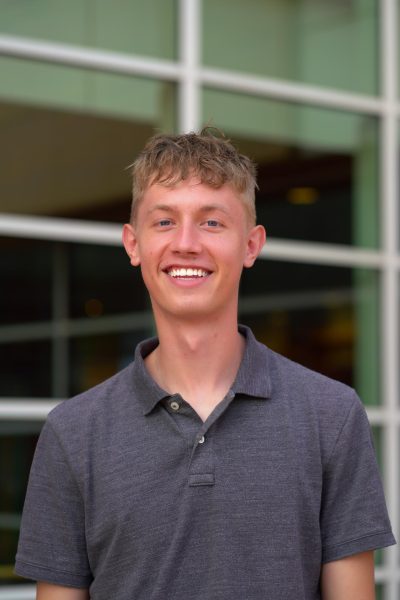Grinnell Students for Justice in Palestine (SJP) members have organized a walkout, two vigils, a rally and a “die-in” to protest the College’s response to the Israel-Hamas conflict, prompting a divided reaction from College administration, faculty, alumni and students. Most recently, the students staged a sit-in at Nollen House that began Thursday afternoon.
But both Grinnell SJP and College President Anne Harris appear unwilling to waver from their positions on the College’s refusal to issue a call for a ceasefire in the Israel-Hamas war and stop investments that support Israel or its army.
“If there were simplicity in this situation, we would not be in the horrible humanitarian crisis that we’re in right now,” Harris said in an S&B interview. “And so I appreciate people saying it’s simple to do X, Y or Z. I wish that a statement could make things better.”
Harris was referencing a student “die-in” at the multicultural alumni dinner in Grinnell on Nov. 11. “But to go into that space of grief is not a demonstration,” she said. “It would have to be something that is deeply intentional.”

However, Grinnell SJP members the S&B interviewed said a College statement and divestment would have a meaningful effect on the Grinnell community and the war.
“It’s not during times of ease when you can tell if an institution is truly morally rigorous or aligning with its claimed values,” Salma Hassab `27, a member of Grinnell SJP, said. “It’s during times when people are passing away, when women and children are dying indiscriminately, that the moral worth of an institution like Grinnell can be seen.”
“I don’t think it’s radical to show solidarity for people even if it makes those who would rather stay silent uncomfortable. Especially at an institution that truly does claim in every newsletter and email and attempt to recruit that this is a place of change,” Marie Reyes-Alvarez `26, also a member of Grinnell SJP, said.
“We go to a school that purports to have an agenda of change and inclusion and caring. I think that’s what Grinnell is purportedly built on. It’s what professors tell us changes the world.”
President Harris said that she is guided by the College’s three core values — social responsibility, a diverse community and excellence in education — as she considers responding to the war.
“Grinnell is, first and foremost, an educational institution,” Harris said. “Grinnell College, when it speaks in a collective voice, does so as an educational institution that values free inquiry and the open exchange of ideas as well as personal, egalitarian and respectful interactions among all members of the college community.”
Updated figures estimate that 15,000 Palestinians have been killed in Gaza, which includes 6,150 children, according to the Gaza Health Ministry. Israel’s Foreign Ministry claims 1,200 Israelis were killed by Hamas militants during the Oct. 7 attack. As of Thursday, Israel had released 180 Palestinian prisoners and detainees and Hamas had released 81 hostages, and the humanitarian pause has been extended through at least Friday, Dec. 1.
Harris’ statements on Oct. 9, Oct. 25, Nov. 1 and Nov. 20 express “sorrow for the grief and losses” that the Grinnell community has faced in the wake of the war, but do not address Grinnell SJP’s demands.
Hassab said that she believes the College is “trying to appease both sides” with statements of neutrality. “It does not reflect well on everyone that takes part in this community.”

Harris did not comment in email exchanges with the S&B after the interview on the specific allegations that Grinnell SJP made about the College’s response to the war. She said in the interview that the College does not want to be operating in a space of demands and declarative statements.
“I, in partnership with many others, am working to be in a space of dialogue, not only in a space of demands,” Harris said. “Systemic change happens through dialogue, and it happens through partnership.”
Reyes-Alvarez said that Harris’ comment misrepresents how change often transpires.
“Saying that dialogue is what affects social change is a historic misrepresentation of activism that is used to silence people who do direct action. What changes things is action and community solidarity,” Reyes-Alvarez said.
Lena Wiebe `25, a member of Grinnell SJP who was involved in a meeting and email correspondence with Harris regarding the College’s response, said Harris expressed concern about the optics of the College calling for a ceasefire.
“Something that frustrated me in my meeting with President Harris was this assertion that she wouldn’t want a statement to be performative,” Wiebe said. “How can something be performative when the people who are suffering are asking you to use your power and your voice to call attention to their suffering?”
“It is very dangerous to make it so that the loss of human life is somehow a complex, nuanced issue,” Hassab said. “I appreciate that there are aspects of this genocide that one may construe as complicated, but one of those aspects is not the 11,000 Palestinian lives that have been lost and the 20,000 that have been injured.”
Hassab, Reyes-Alvarez and Wiebe, who spoke to the S&B as a group, all said that Harris asked Grinnell SJP in late October to disband their affiliation with the National Students for Justice in Palestine organization.
Harris told the S&B that she merely expressed concern that the affiliation would overtake Grinnell SJP’s message, citing a disconnect that she perceived between the National SJP and Grinnell’s chapter.
“I know Grinnellians to be fiercely independent. We don’t have many national organizations at Grinnell,” Harris said. The College does not plan on disbanding the campus group, however, as long as it meets the community standards that apply to all registered student organizations, she said.

Harris said that, as of now, the College does not plan on responding to Grinnell SJP demonstrations through an all-campus email, indicating that she always thinks about precedent.
“To me the practice of responding to it [protest] hasn’t been done and there’s likely a good reason,” Harris said.
Reyes-Alvarez said that Grinnell SJP plans to continue calling for peace, even if the College does not meet its demands.
“This [mobilizing] is about the Palestinian and Arab Muslim people on this campus who feel unsafe or feel as though the institution that they have chosen to give their money to doesn’t care for them. We will always listen to those voices, and we will always listen to Jewish voices,” Reyes-Alvarez said.
Professor Kesho Scott, who briefly joined student demonstrators during the “die-in” on Nov. 11, said that the College must continue to respect student voices.
“I’m not surprised that students would express their opinions in this form,” Scott said, speaking to the S&B after the “die-in.” “I taught social movements for 35 years and I would have taught them to do the same thing. I think what they did was honorable and powerful.”
Caleb Elfenbein, professor of history and religious studies and associate dean for diversity, equity and inclusion, said that the war has shown the importance of community and dialogues of trust.
“I think so many of us, people who end up at Grinnell, are especially likely to fall into this camp of feeling the responsibility to learn about what is happening in the world. But it can create such feelings of disempowerment, such feelings of pain, at seeing people suffering and not having a direct way to ease that suffering,” Elfenbein said. “Does it lead us to potentially overlook the humanity of people who might be right around us?”

















































